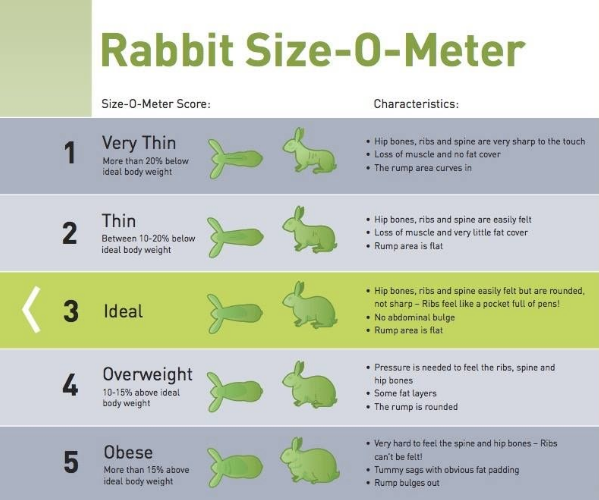Weight - Ideal? Underweight? Overweight?
Assessing your rabbit's weight/body condition is something that you should be doing once a week - as part of a regular wellness check, in order to identify any changes earlier rather than later, when it may have become a problem that is harder to solve. Weighing your rabbit regularly - at least every three months, is also a good idea as this can highlight any loss or gain trends that may not yet be obvious from a body condition check up.
"Body condition scoring is a technique used in many animals and humans to assess if they are in good body condition, too thin or obese. Obesity is a common problem in all companion animals and unfortunately it is also seen in rabbits – one in four rabbits seen at the Rabbit Clinic, Royal (Dick) School of Veterinary Studies, University of Edinburgh, are obese."
Body Condition Score - Rabbit welfare Assoc and Fund
Rabbit Size-O-Meter explained...
Rabbit Size-O-Meter PDF - this is the full version of the chart below and has more detail.
"Your Rabbits' specialised digestive system means you must feed the right combination of foods to keep your rabbit healthy and their digestive system working effectively."
Rabbit Diet and Feeding - The House Rabbit
"Slim and sleek. This is veterinarian and author Dr. Susan Brown’s description of what a healthy rabbit looks like, although lack of exercise, poor diet, and overfeeding can drastically change that appearance."
A General Discussion on Weight Loss/Gain for Rabbits - House Rabbit Society
Weight Gain for Skinny Rabbits
There are lots of opinions on how to go about this but my tried, true and safe method is discussed here -
* First up the rabbit needs a thorough check up with a rabbit savvy vet. As part of this checkup they should carefully examine the rabbit's teeth including the back teeth/the molars to check for spurs, and ideally a faecal test should be done to check for parasites such as worms and/or Coccidiosis. A urinalysis especially to check renal function as well as a full blood panel which is also useful.
* If an issue is found and it can hopefully be treated. Once it is dealt with and whilst the rabbit is recovering, you can make some dietary adjustments to help your rabbit regain lost weight.
Some common suggestions I DON'T recommend ...
* Feed rolled oats
- I don't recommend this for a few reasons. Feeding oats can make for fat rabbits sure... but we don't want a fat rabbit, we want our rabbit to gain healthy, lean muscle not fat.
- I have seen cases of partial gut blockage in rabbits fed rolled oats, so why run the risk when there are safer options?
* Feed fruit, fruit puree, root vegetables, juice or sugar water ...
- Bad idea! The last thing you want to do to a rabbit that may already have issues with its gut is to overload it with foods high in sugar which can lead to overgrowth of undesirable gut flora/bacteria.
* Feed more greens
- Greens are inherently high in water and will fill your rabbit up, meaning they won't eat as much of their more nutrient dense foods. Over feeding them can also cause a potentially compromised gut to struggle and result in poopy butt as well as having an impact on dental health due to less hay consumption.
* Feed unlimited pellets
- Yes, this will make your rabbit gain weight BUT it will also reduce the amount of hay your rabbit eats and as we know, hay is essential for dental and gut health.
So, what CAN you do to help your rabbit gain weight?
* Stick to our recommended daily portion of 1/8th of a cup of pellets per kg of bun weight per day but add a high quality junior pellet to your rabbit's exisiting pellets. I am assuming here that you are feeding a high quality pellet already such as Burgess, Selectives, Oxbow or FibreSafe (a NZ made pellet). If you aren't, now is the time to transition to one of these. Burgess, Selective and Oxbow all make a junior pellet. When I take this approach, I use a 50:50 junior/adult mix.
Click here to read all about Pellets in more detail.
* Often in bonded pairs, one rabbit will be a piggy and scoff most of the pellets leaving its partner with an inadequate portion. So feed your rabbit its pellet portion apart from any other rabbits so that you know it is getting the correct daily amount to help maintain a healthy weight.
* Add up to 30% Lucerne hay to your rabbits normal hay. Lucerne is higher is protein so will assist weight gain. Another approach is to mix Timothy and Lucerne Chaff and fed that in a bowl.
* Use a food such as Critical Care to add a concentrated supplement to your rabbit's daily diet. You can offer this in numerous ways - make a sloppy mix and offer on a flat dish, mix some CC with a little water to make 'balls' to feed or add it to some home made treats as a binding agent, offer it via a feeding syringe.
* Make some healthy home made treats to supplement your rabbit's daily intake. But a word of caution ... lots of recipes rely heavily on the use of oats or fruit like banana, apple puree, baby food or carrots as a binder, I don't recommend this. See Home Made Rabbit Treats for some ideas.
* Weigh your rabbit weekly to help keep track of his/her progress.
Hemp Seed Oil / Pellets as a Weight Gain Supplement
The above measures work well for me. However with a very sick rabbit - such as one coping with cancer or a very elderly rabbit, I do find Hemp Seed Oil and/or Pellets can be very really effective. If you do decide to try this please let me know how you go. I would suggest mixing the oil into chaff, mixing with Critical Care or incorporating into low sugar dried treats. Or, you can source (pure) Hemp Seed Pellets (they are usually pretty large) and give one or two a day.
Weight Loss for Overweight Rabbits
This can be a really tricky situation to deal with. Sometimes obesity is the result of an imbalance in the rabbit's diet. Usually they are being fed too many pellets and/or low quality pellets, too little hay and too many greens. The formula to fix this is quite straightforward.
The approach I take is as follows.
* Feed unlimited high quality hay.
- Do not feed Lucerne or Meadow hay containing Red Clover.
* Feed a high quality pellet in a strictly measured portion.
- If you are not feeding a high quality pellet such as Burgess, Selectives or Oxbow now is the time to transition to one of these. Cheaper/Bulk brands of pellets are full of low quality fillers, have a high grain content and usually contain added sugar in the form of molasses to improve palatability. These pellets are designed to grow meat rabbits fast so they are ready for culling at a young age. They are also used by many breeders because they are a cheap way to feed high numbers of rabbits. They are not designed for optimal gut health or to ensure that our pet rabbits live long and healthy lives.
* Check the portion of pellets you are feeding as discussed in the Pellets file. You will need to feed less than the recommended 1/8th of a cup per kg of bun weight per day with an obese rabbit. Make any changes to daily pellet portions slowly, over a few weeks.
* Transition your rabbit to a 'light' pellet designed for overweight buns.
- Burgess have a 'light' pellet in their range and Selective 4+ and GrainFree are good options as well.
- Aim for a pellet that is high in fibre and lower in protein. Ideally a fibre content of 18-30% and protein level of around 12% is most effective.
* Do not feed treat foods.
- Instead, use part of your rabbit's pellet portion as treats. If you want to give an alternative treat you must reduce your rabbit's pellet portion accordingly.
* Feed bonded rabbits separately to make sure that the obese rabbit is not getting more than their fair share.
* Continue to feed greens but ...
- Feed long fibrous grasses and higher fibre weeds vs low fibre veges.
- Do not feed any starchy veg such as carrot and absolutely no fruit or anything sugary.
* Ensure your rabbit gets plenty of exercise.
- Your bun needs lots and lots of space to run around and 'rabbit' in both for its physical but also it mental health. You can read more about the minimum amount of space recommended in the Housing Guidelines file.
Further Reading:
Weight Loss Diet for Overweight Rabbits - The House Rabbit
Is Your Rabbit too Fat? - Rabbit Welfare Assoc and Fund
One Fatty, One Skinny in a Bonded Pair - Colorado House Rabbit Society
How to Help an Overweight Rabbit | Pet Rabbits
Copyright Jen Herd/Westley's World 2020.

